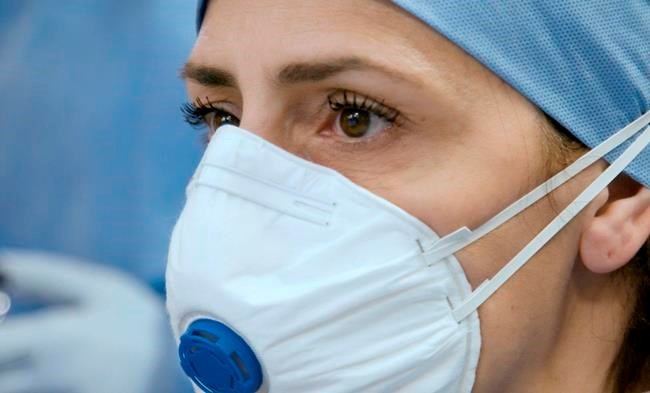NEW YORK — Filmmaker Sasha Joelle Achilli has made documentaries on the Ebola virus and now the coronavirus. Ask which virus scares her more, and the answer is easy.
“The frightening thing about COVID is it's everywhere, and you just don't know,” she said. “It is airborne and it feels much more easy to contract. So it was more frightening, definitely.”
Achilli's film, “Inside Italy's COVID War,” is being shown on “Frontline” at 10 p.m. Tuesday on most PBS stations. While the documentary looks at the crisis through the eyes of an emergency room doctor at Cremona Hospital in northern Italy, the story is universal.
The scene at Cremona, where Dr. Francesca Mangiatordi calls various care providers, pleading for empty beds to place the coronavirus patients crowding her emergency room, could have been at any hospital where the pandemic has hit hard.
Achilli spent four months in Africa making the 2015 film “Outbreak” for PBS. It's not that Ebola wasn't scary — you're more likely to die an ugly death if you get it — but it's easier to protect against than the coronavirus, she said.
Since she's from Italy and her father still lives there, the coronavirus story was more personal.
Finding Mangiatordi was a stroke of luck. A picture the doctor took of an exhausted colleague circulated widely online, and Achilli reached out before she even
“It has a special quality to it, the intimacy she was able to foster and the trust,” said Raney Aronson-Rath, executive producer of “Frontline.” “That kind of trust usually takes a lot of time, but Sasha was able to build that trust very quickly.”
Achilli's camera catches a 30-year-old woman, sitting alone in a wheelchair and calling her husband to say her the X-ray of her lungs didn't look good.
“It feels like a nightmare,” the woman said.
Most affecting is the story of 18-year-old Mattia. Frightened that he was going to die, he was too overwhelmed to take a video call with his mother before being intubated. The nurses thought he wouldn't survive. Later, after his recovery, you see an emotional video reunion with his mom.
At one point, Mangiatordi looks worriedly at a work chart, wondering if there will be enough doctors to fill all the shifts because many of them had gotten sick. One such doctor, Laura Bocchi, says “I'm a patient and I unfortunately possess medical knowledge,” as she isolates from her family.
Through it all, the medical staff rides a roller coaster, briefly euphoric when the number of cases go down only to see another rush.
After grinding days of work, Mangiatordi came home to a family she literally couldn’t touch — a husband who’s both proud and fearful, and an 11-year-old daughter who cries at the thought of life without mom. “We wouldn’t know how to do anything,” she says.
“Some of the moments with her family are ones that I'll never forget,” Aronson-Rath said. “We didn't want to do a congratulatory film about doctors but what emerged was a heroic portrait of people trying to save other people.”
“Frontline” has other coronavirus projects in the works, including a June 16 documentary investigating what went wrong with the response and others about the financial fallout and conspiracy theories.
Although Achilli's father lived an hour away from where she was filming, she wasn't able to see him. In addition to making sure that she and a partner were fully protected while filming, there was the additional worry that they would unwittingly transmit the virus themselves.
Watching the film comes with a deep sense of foreboding. Purely by chance, Achilli says, the characters that she focused upon all had good outcomes.
“I hope that it gives people strength, that if you are to contract the virus, there is a light,” she said. “I think we need strength right now. We're all living this quarantine. We're not seeing what is really happening.”
Achilli finished her film — and lived through stay-at-home orders — from London. She recognizes that people are becoming antsy, wanting to get out of the house into some measure of a normal life.
Those people might want to watch her film.
“Having seen what happened to the health system, having seen what the doctors had to go through, I think that the lockdown and going through these draconian measures is the only way to get this under control,” Achilli said.
“I understand that our freedoms have been taken away — that we're not used to living like this, and not used to having governments tell us what we can and can't do," she said. “But when you see what they're going through, for their sake, stay home.”
David Bauder, The Associated Press


